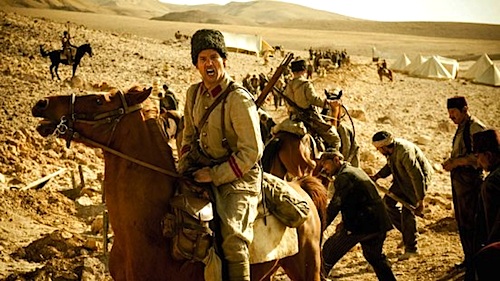By Joe Bendel. If you want to generate an avalanche of email, some of which speculating on the nature of your parentage, then merely point out somewhere online that the Muslim Ottoman Empire essentially invented genocide in 1915. No serious historian disputes the Armenian Genocide, but the denial reaches levels well past the absurd, approaching outright lunacy. Therefore it is somewhat encouraging to see hardcore leftist Turkish-German filmmaker Fatih Akin seriously address the subject. His reference point is more The Searchers than Schindler’s List, but there is no denying the enormity of the events of 1915 in Akin’s The Cut, which opens this Friday in New York.
In his Armenian enclave bordering Syria, Nazaret Manoogian can tell an ill wind is blowing from Constantinople, but he hopes the worst of it will be the impressment and slave labor endured by the village’s able-bodied men. Alas, true horrors await when they finally finish the highway for the military. The entire work party is then massacred by a group of convicts specifically liberated for such duties. However, Mehmet the thief has no stomach for mass murder. At risk of death he slices Manoogian’s throat, but only cuts deep enough to sever his vocal chords, rather than a major artery.
The resuscitated Armenian and Mehmet soon fall in with an apolitical group of Turkish deserters, but Manoogian subsequently lights out on his own after hearing survivors have congregated in Ras-al-Ayn, essentially to wait for death. From there, Manoogian will follow an epic trail that leads through Syria, Lebanon, Cuba, Florida, Minnesota, and North Dakota, in search of his surviving twin daughters, Lucinee and Arsinee.
Akin deserves credit for fully facing up to the Armenian Genocide in the Ras-al-Ayn sequences, as well as the brutal mass murder of his fellow villagers, but it clearly makes him uncomfortable. Arguably, the film’s emotional power peaks in the Ras-al-Ayn dying fields. For the next two acts, Akins seems to be desperately searching for “righteous” Muslims to protect Manoogian and thuggish Americans to torment him as he pursues his quest.
Nevertheless, Akin absorbed plenty of the right lessons from John Ford. The vistas do indeed sweep. Alexander Hacke’s muted electronic soundtrack is also quite effective, creating an appropriately otherworldly vibe. Truly, there are times when Manoogian might as well be on Mars. However, the narrative’s Homeric episodic nature is inevitably uneven. Some scenes just work better than others.

Still, Tahar Rahim nicely anchors the film with necessarily quiet power. He is acutely expressive without ever indulging in exaggeration or Streep-like excess. Once again, the Cecil B. DeMille-worthy supporting cast is a decided mixed bag, with Bartu Kucukcaglayan and Kevork Malikyan earning notice as Mehmet and the Cuban barber who befriends Manoogian, respectively.
When Raphael Lemkin coined the term “genocide,” he did so specifically in response to the systematic Ottoman massacre of Armenians. Frankly, the denial is becoming toxic for the deniers, so if someone with Akin’s ideological standing acknowledges the historical record, it might just help dilute some of the vitriol. The Cut is not perfect but it towers above his unsoulful Soul Kitchen. Recommended on balance for those interested in the Armenian Genocide (a tragedy scarcer than albino elephants in cinema), The Cut opens this Friday (9/18) in New York, at the Landmark Sunshine and Lincoln Plaza Cinemas.
LFM GRADE: B
Posted on September 18th, 2015 at 2:33pm.
Wrong. The Ottoman Turkish Empire invented genocide somewhere around *1895* at the latest. What most people forget about the genocides of 1915 is that they were just the culmination of twentyplus years of racial and religious slaughter by the Turkish government against its’ own people, that the Young Turks were actually latecomers to the genocide train, and hat it wasn’t limited to the Armenians.
Just google “Sultan Hamid” or the “Hamidian Massacres” and see what I mean. The fact that so many people- even good, educated people- don’t realize the truth of this mess or the context of 1915 means that the genocidaries and denialists are winning.